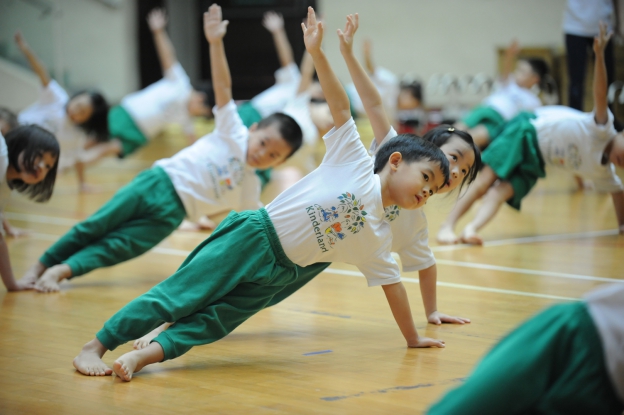SingaporeMotherhood | Parenting
April 2015
Fitness for Kids: It’s Never Too Early!

The mention of fitness might trigger mental images of sweaty men and women gruelling themselves at the gym, all in the pursuit of a svelte figure and good health. But, are fitness and nutrition facets of health which only adults should concentrate on? What about our little ones? Some parents might be holding on to the misconception that fitness is not an essential aspect to devote time and attention to when your children are in their preschool years. However, recent studies have pointed to worrying trends concerning young children and their involvement in physical activity.
The impact of technology has significantly manifested itself through our current rampant use of smart devices such as smartphones, iPads and tablets. Researchers at the Boston University School of Medicine have warned that excessive use of such devices can lead to detrimental effects on a child’s physical, social and emotional development.
Replacing hands-on activities with time spent on smart devices compromises the development of a child’s sensorimotor and visual-motor skills, which are crucial for the learning and application of subjects such as Mathematics and Science.
The early years are critical for helping children develop fundamental movement skills for daily living activities, since these form the base upon which other niche skills are built.
Children who lack competency in movement skills early on will be less likely to acquire sports-specific and complex motor skills in the later stages of their childhood. It is therefore important for pre-schoolers to obtain proficiency in movement and participate in motor activities which hone trunk control and balance, before initiating physical routines which require manipulation of hands, legs and feet.
Kinderland, a preschool chain in Singapore, has initiated the KinderFit Programme in a bid to get its young ones physically active. The initiative was conceptualised based on pioneer of European Modern Dance, Rudolph Laban’s movement-based framework, and Dr Charles T. Kuntzleman’s celebrated American cardiovascular fitness programme “Feelin’ Good”.
The KinderFit Programme enables young children to develop positive fitness and health practices, providing a range of experiences that encourage psychomotor, cognitive and affective development. Modules are centred around themes which involve the human body and its relation space, time, effort and flow. Activities comprise fundamental movement skills, cardio-wellness programmes, lessons on healthy eating and nutrition, as well as customised meal plans.
Conducted weekly, each thirty minute session covers both aerobic and strengthening exercises and students are assessed on their developmental skills at the end of every term, which spans ten weeks. Each lesson starts off with two minutes of warm-up exercises, followed by five minutes of aerobic exercises and twenty minutes of strengthening exercises before ending with a three-minute long cool-down routine.
It is encouraging to note that preschool educators are incorporating physical activities into their timetables in order to trigger the interest of our little ones in fitness and sports. But what about sustaining this newfound interest beyond the realm of the school and turning it into a lifestyle? Are Singaporean parents devoting a sufficient amount of time to physical activities for their children? Do they also pay equal attention to the nutritional value of their child’s meals?
Most importantly, are they aware of the ills of their young ones spending too much time on smart devices or watching television? The consequences could prove disastrous should proper time limits not be imposed. The mothers we spoke to agreed that the frequent and lengthy use of smart devices by preschool children is not advisable, and that more time should be allocated for physical activities.
38 year old Nisha Nair is mother to three boys, two of which are six year old twins, Sanjeev and Sanjeevan. She is currently a stay-at-home mother; she was previously a Mental Health Nurse cum Perinatal Case Manager. Her twin boys enjoy outdoor activities such as visiting the playground, playing frisbee, riding their kick scooters, dribbling basketballs and kicking around a football. They also enjoy swimming and attend Taekwondo lessons every Saturday.
She adds that they also help with minor household chores such as folding their own laundry, putting their clothes on hangers and wiping dry small pots and pans. “These help to develop their motor skills as well,” says Nisha. The boys, who enjoy watching cartoons on television, are limited to a maximum of two hours per day. As for using smart devices such as their tablet PC, it is restricted to the weekends for about two to three hours each day. Sanjeev and Sanjeevan usually play games or watch some educational programmes on it.
35 year old doctor, Chua Tien Wie, is mother to two children aged three and six. She states that she does not have a fixed exercise regime for her children at home, but they do enjoy chasing each other around, jumping around on a play mat and playing throw-and-catch ball games. They are currently showing an interest in cycling.
Her six year old has swimming classes on Saturdays, and the family usually frequents parks and playgrounds on weekends. The children also visit the playground to ride on their kick scooters or cycle on at least two weekdays. Tien Wie strongly agrees that young children should be given the opportunity to run around and play, and that parents should ensure that they strike a balance between spending time on smart devices and getting involved in physical activities. She is willing to allocate at least five to six hours each week for her young children’s fitness, simultaneously ensuring that they only spend a maximum of an hour on smart devices on weekdays, and two hours on weekends.
Nutrition wise, her only gripe is that it is an uphill task attempting to get her three-year-old to eat vegetables! She states, “They do snack on small quantities of snacks almost daily, but I do try to pick the healthier ones like nuts, fruits, seaweed snacks and multivitamin gummies.” Her six-year-old daughter is usually allowed to have ice cream once a week and fast food occasionally.
Dorine de Lopez, aged 33, is currently a performer and was formerly a teacher. She has two children; they are aged two and a half, and four. Just like other preschoolers their age, hers too enjoy visits to the playground and the swimming pool. They especially love going to the Gardens by The Bay and the beaches at Sentosa.
Dorine says that they only use their smart devices for an average of thirty minutes each day; they do not use them daily. Her take on them? “Children get easily addicted to using tablets and smartphones. They haven’t got any sense of how long they spend using them, so they could spend hours on them if we allow them to. The best would be to avoid any use of smart devices at all.”
According to her, physical activity is far more important. She believes that starting physical education at an early age shapes both the mind and body not only for the present, but for the future as well. She adds, “Physical activities not only make the body stronger but also leave a positive impact on our behaviour, on the way we think and on our self-perception.
On a long-term basis, exercise builds up stamina, self-esteem and confidence.” With regards to nutrition, she states that, unfortunately, her children are extremely picky eaters. Dorine is aware that it is scientifically admitted that we should consume five portions of vegetables and fruits daily in order to maintain a well-balanced diet. She tries to fulfill this goal as much as possible. “Junk food is a special treat that we have every now and then,” she concludes.
It appears that parents are indeed well aware of the importance of kickstarting their child’s interest in fitness and nutrition at a tender age. However, the true challenge lies in sustaining the initial enthusiasm and turning fitness and healthy eating into a lifestyle. Given the numerous benefits which exercise and proper nutrition provide, any parent would definitely be inclined to make time in their schedules to get their littles ones as fit as fiddles!
All content from this article, including images, cannot be reproduced without credits or written permission from SingaporeMotherhood.
Follow us on Facebook, Instagram, and Telegram for the latest article and promotion updates.










